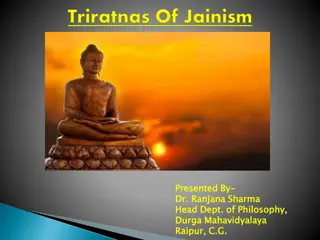Features of Jainism: An Overview Presented by Debajit Hazarika, Assistant Professor
Jainism is an ancient non-Vedic religion with roots tracing back to the times of the Indus Valley Civilization. It emphasizes non-violence, self-conquest, and spiritual liberation through 24 Tirthankaras, with Lord Mahavira being the most significant. Jainism stands out with its rejection of caste d
1 views • 7 slides
Ancient Heterodoxies: Buddhism and Other Radical Ideas in the 6th to 4th Centuries BCE
Explore the Age of Heterodoxies in the 6th to 4th Centuries BCE, focusing on Buddhism, Jainism, and other radical ideologies challenging orthodox beliefs. Learn about the key figures like Buddha and Mahavira, their teachings, and the societal implications of these heterodoxies. Uncover how these ide
0 views • 16 slides
Overview of Jainism: Philosophy, Teachings, and Principles
Jainism, derived from "Jina," meaning conqueror, is a faith based on conquering passions and desires. It has 24 Tirthankaras, with Mahavira being a prominent figure who gave Jainism a new direction. Jain canonical literature, teachings on knowledge types, and beliefs in perception, inference, and au
0 views • 17 slides
The Axial Age: Pivotal Thinkers Across Ancient Civilizations
The Axial Age, coined by Karl Jaspers, refers to a period from the 8th to 3rd century BCE where pivotal thinkers emerged independently in Persia, India, China, Greece, and Rome, shaping the spiritual foundations of humanity. Jaspers, a German philosopher and psychiatrist, highlighted the importance
2 views • 21 slides
Understanding Jainism: Path to Liberation and Right Conducts
Jainism, an ancient religion, emphasizes the path to liberation through Triratna - right faith, knowledge, and conduct. The teachings of Tirthankars guide followers towards dissociation of the soul from matter and practicing virtues like forgiveness, truthfulness, and celibacy to eliminate karmas. B
0 views • 15 slides
Understanding Syadvada: Jain Theory of Judgment Explained
Syadvada, also known as the Jain theory of judgment, emphasizes the relativity of every judgment, based on the concept of Anekantvad in Jainism. According to this theory, every object has innumerable characteristics, both positive and negative. Judgments are considered relative, and complete knowled
0 views • 12 slides
Explore South Asia: Climate, Religion, History, and Culture
Discover the diverse aspects of South Asia, including its climate with seasonal winds and monsoons, religions like Jainism, historical empires such as the Gupta Empire, and unique cultural elements like the significance of a guru. Learn about the region's rich heritage and geographical features.
0 views • 18 slides






